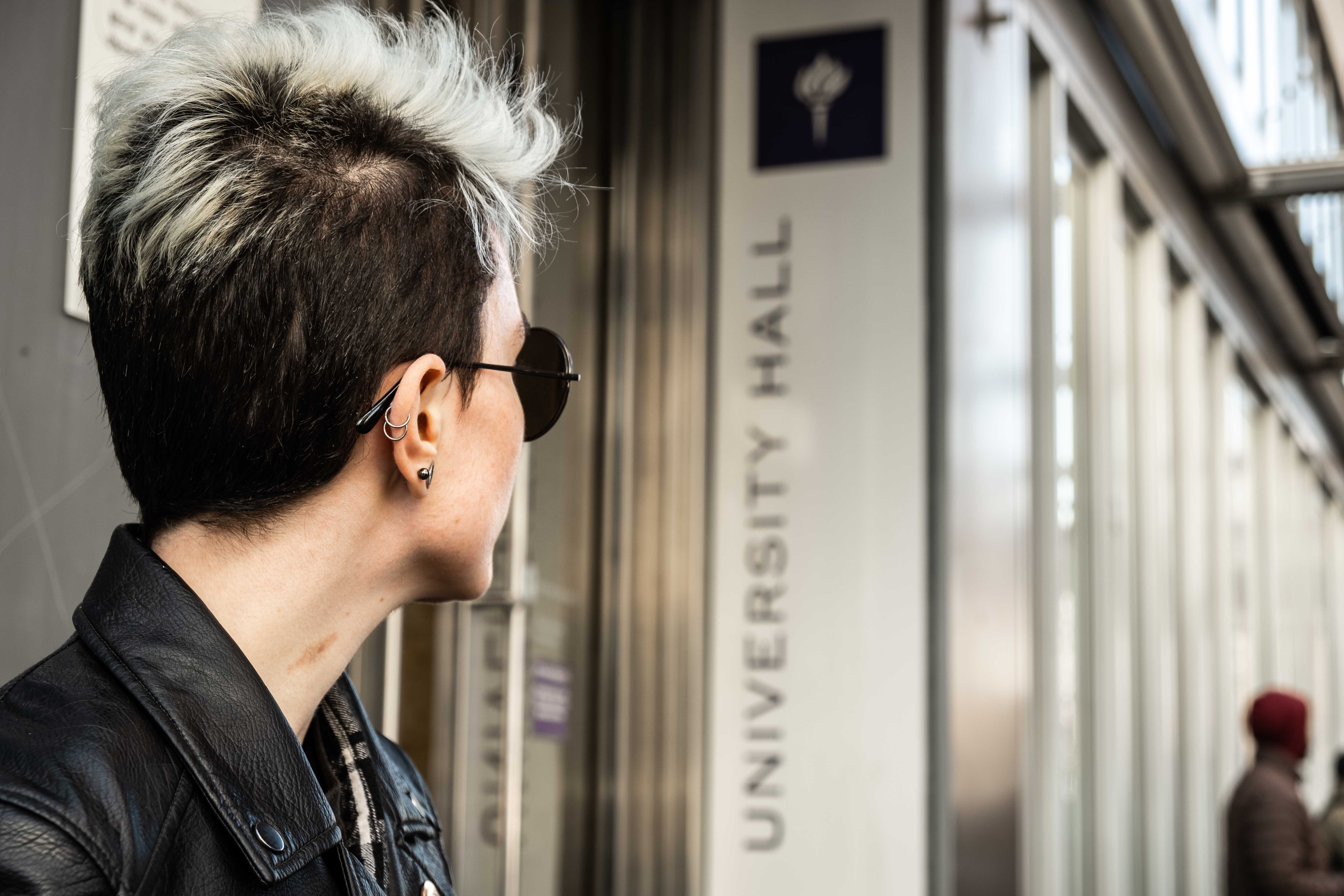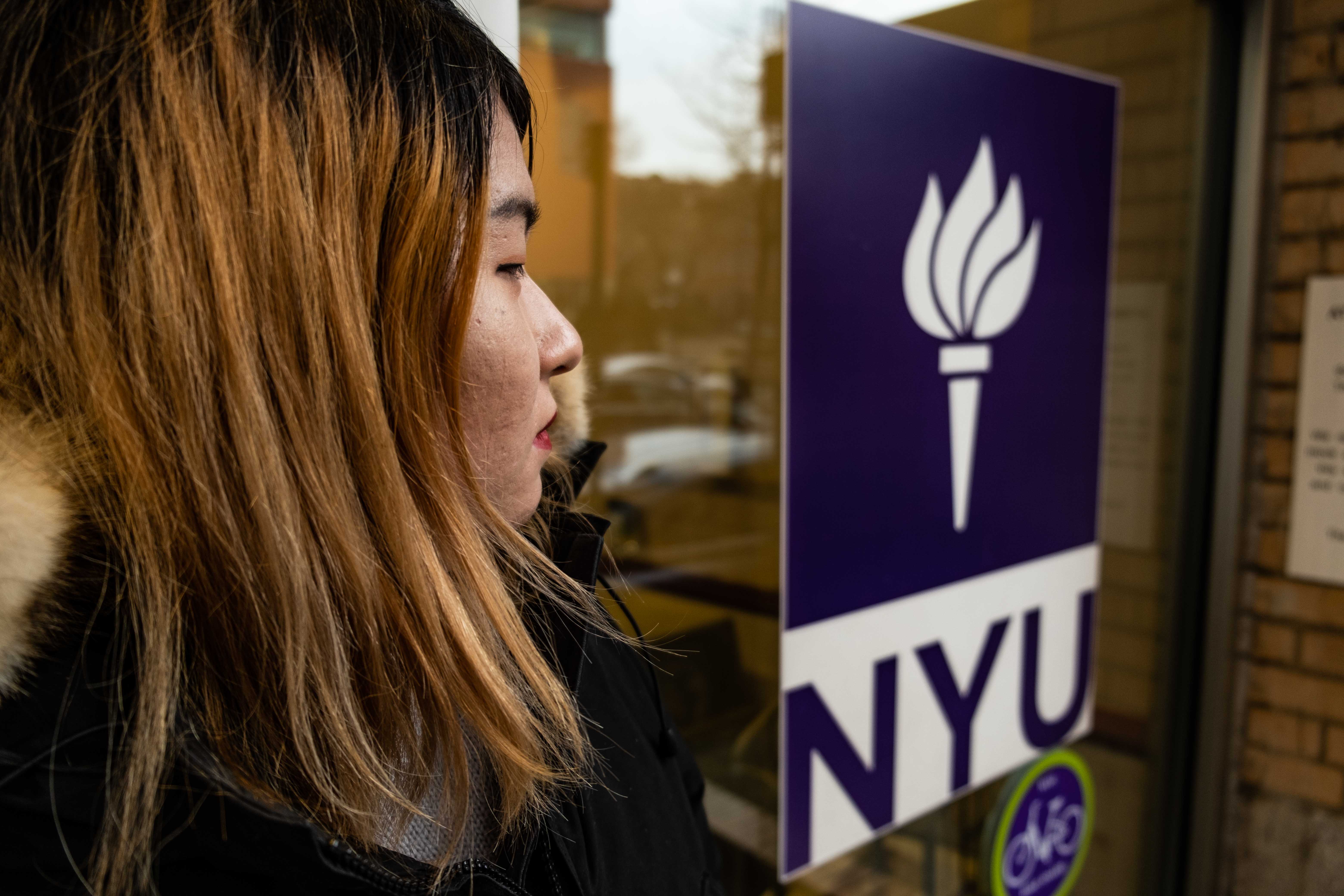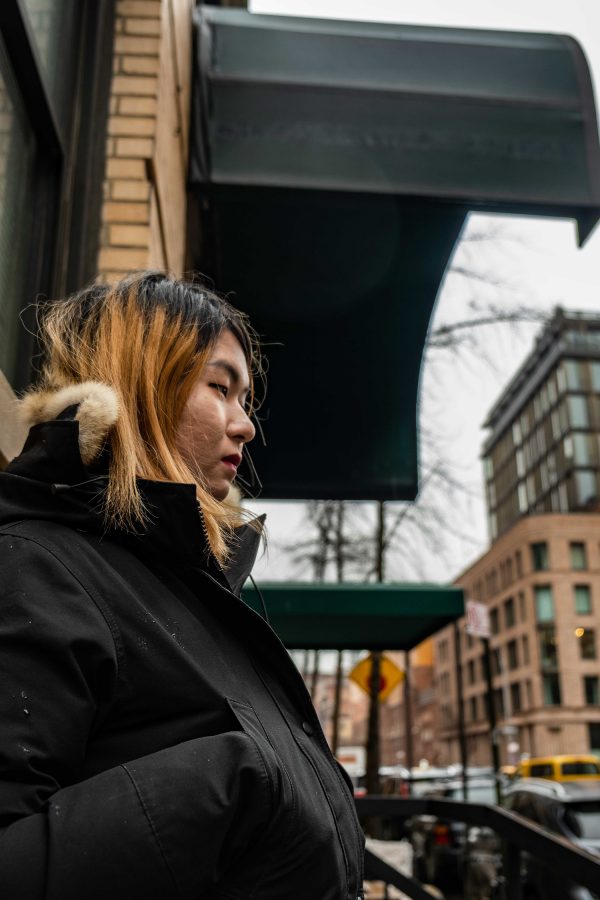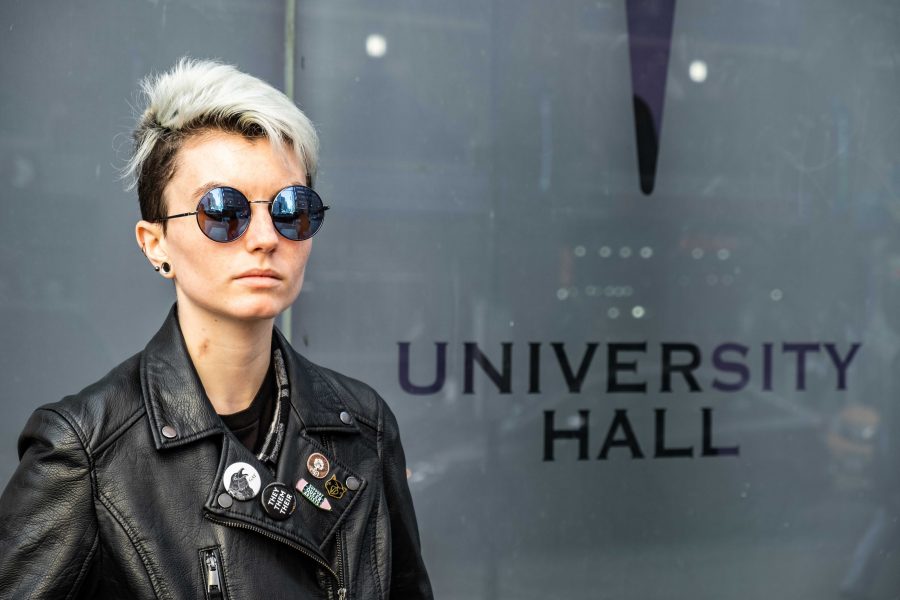The day is surprisingly warm for mid-February in New York — warm enough for Cameron* to only be wearing a black leather jacket over a flannel. They stand in the sun outside their first-year dorm, University Residence Hall, chuckling as they recount a story about their living situation last year.
“I put up a pride flag in my room, and my roommate’s friend asked her about it over FaceTime,” Cameron explained. “She laughed. She responded that that’s because I love colors — I’m an art major. Also, she wasn’t super OK with queer or trans people.”
For their entire first-year fall, Gallatin sophomore Cameron, who is non-binary and uses they/them pronouns and asked to be only referred by their first name, stayed closeted about their gender identity and sexuality until their roommate moved out at the beginning of last spring.
“It wasn’t by the fault of anyone but [NYU] Housing [itself],” they said. “I’ve had amazing experiences with [resident assistants] and various people in housing.”
Moving into housing as a first-year can feel intimidating, especially once you start considering all the potential issues. What if my roommate ends up being messy? What if they smoke in the room? What if they listen to music I hate or — even worse — listen without headphones?

But these concerns pale in comparison to what queer first-years face. Will I have to stay closeted? What if my roommate turns out to be homophobic? Transphobic? What if I get bullied for who I am?
For students who don’t identify with the gender they were assigned at birth, inclusive housing is supposed to provide a safe and welcoming environment, preventing gender-based discrimination.
Currently, multiple New York City universities offer gender-inclusive housing, including Barnard College, Columbia University and The New School. At some universities, however, the situation is drastically different. In 2016, the University of North Carolina banned gender-inclusive housing, putting LGBTQ students on campus at risk.
When Cameron applied for housing in 2017, they said an inclusive housing option was not available for first-years, nor was there a way to indicate non-binary gender identity. The inclusive housing option became available for incoming first-year students who apply to live on-campus only in fall 2018.
Executive Director of Housing Services Neil Hanrahan, however, wrote in an email to WSN that first-year and upperclass students have been able to indicate gender identity on their housing applications since 2007, but not indicate living preferences.
“In 2015 [NYU housing] expanded the gender inclusive options to allow all upperclass students the option to indicate a preference to live with suitemates regardless of their legal sex,” Hanrahan expanded.
But this seems inconsistent with some students’ experiences.
On NYU’s Gender Inclusivity page, it’s stated that when a student applies for gender neutral housing, their legal sex plays no role in their placement. When it comes to first-years, most rooms get assigned on the basis of their legal sex, but every student has the opportunity to indicate their gender identity.

When applying for housing in her first year, CAS sophomore Evelyn Zhang, who is transgender and uses she/her pronouns, had the chance to indicate her gender identity but couldn’t request inclusive housing.
“I’m physically male and identify as female, which is what I put in the application,” she said.
Despite this, Zhang was assigned to a room in U-Hall with three cis male suitemates.
“I think NYU considered my situation a little and all of my roommates were, in one way or another, associated with the LGBTQ community,” Zhang said with a smile.
Then, Zhang applied for gender neutral housing her sophomore fall, expecting to be assigned to roommates who identified as women. But the outcome wasn’t what she expected.
“I ended up with three cis males,” she scoffed.
On top of this, Zhang believes that her request to be assigned to a single room in Greenwich Residence Hall outweighed her request for a gender-neutral suite. This led to a difficult housing situation.
Zhang spent the semester in conflict with her suitemates, whom she didn’t feel comfortable talking with.
“Maybe that’s because we’re of opposite genders,” she said. “I felt like I had to be quieter than them and used more polite words, as the only girl.”
From Zhang’s perspective, her suitemates knew little about transgender individuals and even less about living with one. Despite mutual attempts to talk things out, this disparity in knowledge often resulted in further misunderstanding and, ultimately, silence.
In an attempt to fit in better, Zhang purchased boxers, since her usual underwear made them uncomfortable as they perceived her as a male.
“First half of sophomore year worsened my depression and anxiety a lot,” Zhang said. “I don’t blame them, the system just isn’t all that great.”
At the start of the spring semester, Zhang, who was tired of the escalating conflicts with her suitemates, moved out and turned a new page in her housing journey with three cis women.
“Initially, there were three girls with one cis guy,” Zhang said with frustration in her voice. “Why do that, why put a cis-man with cis-women randomly if you can provide inclusive housing for someone who needs it?”

As Vice President of T-Party, a club for transgender, non-binary and gender-nonconforming members of the NYU community, Cameron supports many students who find themselves in predicaments similar to Zhang’s.
“NYU tries to be trans-inclusive in their approach to housing,” they pointed out. “However, it does not work out a lot of times.”
Cameron has encountered several cases where students’ safety and comfort at their dorm were at risk due to their identity.
If necessary, NYU can provide temporary emergency housing for students who find themselves in unbearable or dangerous living situations on campus. Emergency placement gives the university time to find a different housing arrangement for the student.
“I know someone who had to move out because they were trans and NYU’s emergency housing would not take them in,” Cameron recalled.
In the case of Cameron’s acquaintance, the LGBTQ+ Student Center had to intervene and work with housing directly.
“In [emergency] cases, we encourage students
to engage with their RAs and professional staff in the residence hall who can work with staff in Housing Services,” LGBTQ+ Student Center Director Chris Woods said.
According to Hanrahan, emergency housing can’t accommodate many students at the same time, which can occasionally lead to refusal.
“There is not a pool of emergency housing set aside per se,” Hanrahan said. “In the event that any roommate conflict escalates to the point that someone feels unsafe, we would work within our available inventory to attempt to resolve the situation.”
If a student is having issues with their housing situation due to their gender identity or sexuality, both Cameron and Hanrahan suggested they reach out to the LGBTQ+ Center.
According to Woods, the center consistently works with Residential Life and Housing Services to ensure the comfort and safety of LGBTQ students in on-campus housing.
“The LGBTQ+ Center has been working to provide updated training and education to the Office of Residential Life and Housing Services, starting with the professional staff and making our way toward the student staff in the residence halls,” Woods said.
Woods explained that the LGBTQ+ Center works closely with Housing Services and has direct, regular communication with them in order to address the specific needs of LGBTQ students in the residence halls.
“Most recently our conversations involved the incorporation of preferred pronouns into the housing system,” he pointed out.
According to Hanrahan, 2,320 undergrads indicated their gender identity or requested gender neutral housing on their housing application for the 2018-19 academic year, indicating that these options are popular among the student body.
CAS first-year Hazel Williams, who is transgender and uses she/her pronouns, is one of those applicants. She currently shares a triple in Lipton Residence Hall with two transgender, female-identified roommates.
“The options when applying for inclusive housing were female-identified, male-identified or according to legal gender,” Williams said. “I chose ‘female-identified’ as it made me feel the safest.”
Williams, who knows other first-years who specified inclusive housing preference, believes that some of the first-year students ended up in singles due to their choice of inclusive housing.
On providing single rooms to those who request inclusive housing, Hanrahan pointed out that single occupancy bedrooms constitute approximately three percent of housing inventory.
This makes the chance that a first-year who requests gender neutral housing is placed in a single room slim, even if they couldn’t be assigned to an inclusive suite.
Living with others who are currently transitioning, Williams encounters a lot of unintentional overstepping of personal boundaries.
“One of my roommates often asks me about how HRT [hormone replacement therapy] changed me personally and some of these inquiries are just too personal,” Williams said. “It affects everyone differently and saying something would be giving expectations.”
Minor frustrations aside, Williams rates her experience living in inclusive housing as a positive one.
“I don’t have to fear gender- or sexuality-based violence, living with them,” she said with a smile. “To knock those worries and fears off the list feels great.”
Williams believes that changing the requirement for legal name indication could help a lot of trans students feel more comfortable when applying for housing on campus.
“After all, it’s nobody’s business except for the administration’s and the bursar’s,” she said. “Why would your RA need to know? My legal name is still everywhere in the system, even though I recently changed it, and it makes me uncomfortable.”
Cameron believes that the safety of LGBTQ students in housing would improve greatly with a better screening process for first-years applying for NYU housing.
“[The] housing questionnaire is so short; I had to answer four questions,” they said. “Columbia and Barnard, for example, have really long questionnaires. Making them longer and adding an option ‘if you’re LGBTQ-friendly’ is important, especially for the safety of LGBTQ+ kids.”
Cameron believes that ensuring the security of LGBTQ students has to be a priority.
“Having a bad housing experience can ruin the first year of college for you,” Cameron said. “There has to be a better screening process implemented to ensure safety and comfort of LGBTQ+ kids.”
Email Anna-Dmitry Muratova at [email protected]. A version of this article appeared in the Thursday, Feb. 21, 2019, print edition. Read more from Washington Square News’ “Housing Guide 2019.”

























































































































































